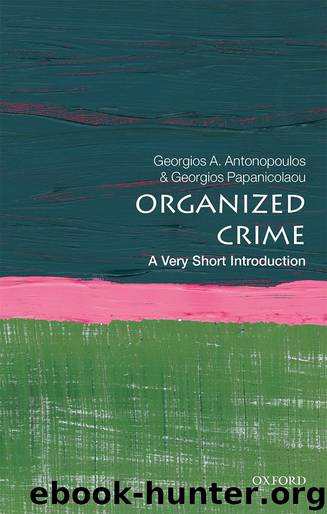Organized Crime by Georgios A Antonopoulos & Georgios Papanicolaou

Author:Georgios A Antonopoulos & Georgios Papanicolaou
Language: eng
Format: epub
ISBN: 9780192514943
Publisher: Oxford University Press
Published: 2017-12-13T16:00:00+00:00
Viewing human trafficking as a business process permits the identification of the three general phases of recruitment, transportation, and exploitation, in which financial inputs and outputs are involved and, therefore, different actors may play a financially significant role. These actors may belong to more robust organizational forms featuring hierarchical structures, or operate within stronger or looser networks whether as individuals or as part of smaller groups carrying out different functional parts (recruitment, transport, protection, marketing) of the activity in one or in different phase of the process. According to UNODC, apart from traffickers themselves, a variety of actors can be involved in the process. They can be individuals who may or may not belong to an organization and who commit or are complicit in the commission of trafficking offences, and also criminals operating peripherally to trafficking and facilitating the commission of trafficking.
Recruitment, excluding the event of abduction of the victim, is known to be facilitated by such diverse actors as friends and family of the victims, travel bureaus, employment agencies, or even artistic management companies and international marriage agencies. Traffickers may use legitimate agencies, but even when an illegitimate front is used, they may present to the victim contracts and legal documentation as a means of alleviating any concerns about trafficking and masking the intended exploitation. Forging documents or obtaining the necessary documents possibly by means of corruption and bribery of law enforcement or other officials is a possibility at this stage.
Transportation, including the stage of harbouring the victims in transit, is also a phase in which different actors performing different functions accordingly (drivers, guides, boat owners, hotel owners, landlords, bodyguards) may be involved. The financial significance is that the involvement of a variety of actors entails transactions that cannot be indiscriminately considered as part of an ‘organized crime’ activity.
Exploitation constitutes the core criminal activity, and, again, it may involve a typology of actors carrying out functional parts of the process. Sex trafficking victims can be highly visible and forced to engage in street-level prostitution. In many cases, sex trafficking takes place in underground venues, such as private homes or brothels. Public and legal locations such as massage parlours, spas, and strip clubs also act as fronts for illegal prostitution and trafficking. Similarly, forced labour has been detected in labour intensive manufacture (e.g. textiles), construction and agriculture.
Download
This site does not store any files on its server. We only index and link to content provided by other sites. Please contact the content providers to delete copyright contents if any and email us, we'll remove relevant links or contents immediately.
The Borden Murders by Sarah Miller(4325)
The Secret Barrister by The Secret Barrister(3710)
Police Exams Prep 2018-2019 by Kaplan Test Prep(2549)
Coroner's Journal by Louis Cataldie(2479)
The Splendid and the Vile by Erik Larson(2474)
Terrorist Cop by Mordecai Dzikansky & ROBERT SLATER(2080)
A Colony in a Nation by Chris Hayes(1935)
My Dark Places by James Ellroy(1931)
The Art of Flight by unknow(1878)
Black Klansman by Ron Stallworth(1796)
Objection! by Nancy Grace(1786)
A Life of Crime by Harry Ognall(1731)
The New Jim Crow by Michelle Alexander(1702)
Anatomy of Injustice by Raymond Bonner(1669)
American Prison by Shane Bauer(1660)
Invisible Women by Caroline Criado Perez;(1642)
Whoever Fights Monsters by Robert K. Ressler(1618)
Obsession (The Volkov Mafia Series Book 1) by S.E Foster(1579)
A is for Arsenic: The Poisons of Agatha Christie (Bloomsbury Sigma) by Kathryn Harkup(1549)
